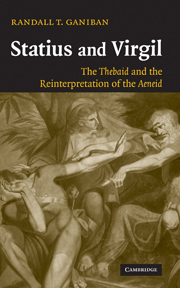Book contents
- Frontmatter
- Contents
- Preface
- List of abbreviations
- 1 Introduction
- 2 Oedipus' curse
- 3 Horror, prophecy, and the gods
- 4 Hypsipyle's narrative of nefas
- 5 Bacchus and the outbreak of war
- 6 Dis and the domination of hell
- 7 Delay and the rout of Pietas
- 8 Spectacle, crime, and monarchy at Thebes
- 9 Pietas, burial, and clementia in a world of nefas
- Works cited
- General index
- Index locorum
7 - Delay and the rout of Pietas
Published online by Cambridge University Press: 22 September 2009
- Frontmatter
- Contents
- Preface
- List of abbreviations
- 1 Introduction
- 2 Oedipus' curse
- 3 Horror, prophecy, and the gods
- 4 Hypsipyle's narrative of nefas
- 5 Bacchus and the outbreak of war
- 6 Dis and the domination of hell
- 7 Delay and the rout of Pietas
- 8 Spectacle, crime, and monarchy at Thebes
- 9 Pietas, burial, and clementia in a world of nefas
- Works cited
- General index
- Index locorum
Summary
The beginning of book 11 depicts the full domination of hell over Jupiter and the heavenly gods. The brothers Eteocles and Polynices finally face each other on the battlefield, but despite the inevitability of their duel, events do not proceed unhindered. As the Furies combine forces to bring about the brothers' nefas, the war's criminality is fully realized by human characters who articulate their horror in the most condemnatory tones heard in the epic. The threat to hell's domination no longer comes from the superi, who will be routed, but from humankind, in whom reside the last real vestiges of moral concern. In book 11, then, we see an escalation both in the power of the Furies on earth and in human resistance to their crimes.
The theme of mora dominates much of book 11, though it is not new to the epic. In chapter 5, we saw how Bacchus emulates the Virgilian Juno in contriving delay to safeguard his honor and power. In book 11, a different type of mora takes center stage: human characters attempt to prevent the brothers from meeting in battle. Unlike the actions of Bacchus, these delays are essentially moral. As characters see that the brothers are about to fight, they are horrified and seek to stop them. The imminent spectacle of the brothers' impending crime motivates these delays.
In this chapter, I will examine the attempts to hinder the nefas that the Thebaid is always and ineluctably approaching.
- Type
- Chapter
- Information
- Statius and VirgilThe Thebaid and the Reinterpretation of the Aeneid, pp. 152 - 175Publisher: Cambridge University PressPrint publication year: 2007



